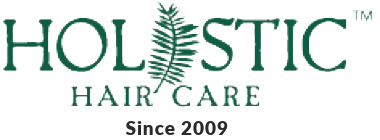{{ Interface.PageTitle }}
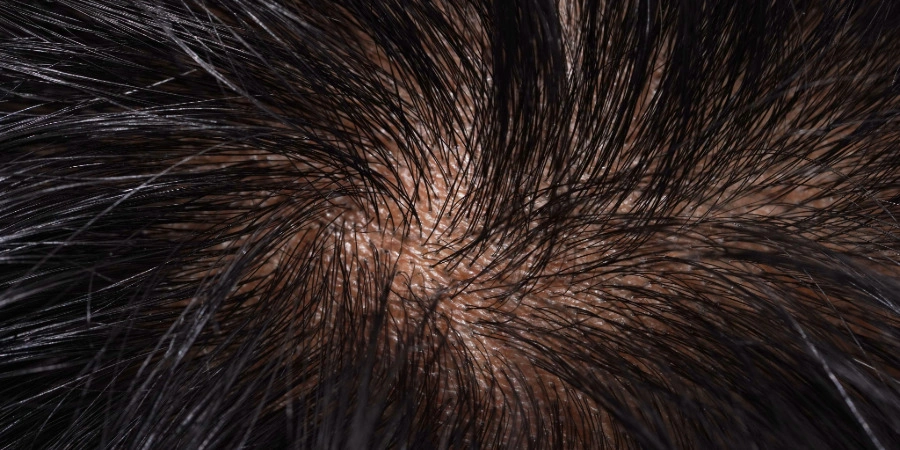
An oily scalp affects millions of people worldwide, causing embarrassment, discomfort, and various secondary hair and skin issues. If you find yourself washing your hair daily only to have it look greasy again by evening, you're not alone. This comprehensive guide will help you understand what causes an oily scalp, recognize the signs, and discover effective solutions available at professional hair care centers.
At Holistic Hair Care, with locations in Kepong, Cheras, and Puchong, our experienced hair care specialists have helped countless clients overcome oily scalp challenges through personalized treatment approaches that address the root causes, not just the symptoms.
What is Oily Scalp?
Oily scalp, also known as seborrheic scalp condition, occurs when the sebaceous glands in your scalp produce excess sebum - the natural oil that normally keeps your hair and scalp moisturized. While some oil production is essential for healthy hair, overproduction leads to that unpleasant greasy appearance and feel that many people struggle with daily.
This condition differs from naturally textured hair that may appear to have more sheen. True oily scalp involves excessive oil production that makes hair look unwashed within hours of shampooing, often accompanied by a heavy, weighed-down feeling and sometimes an unpleasant odor.
The scientific explanation lies in the sebaceous glands' hyperactivity. These microscopic glands, attached to hair follicles, respond to various internal and external triggers by producing more sebum than necessary. This excess oil then travels down the hair shaft, coating both the scalp and hair strands.
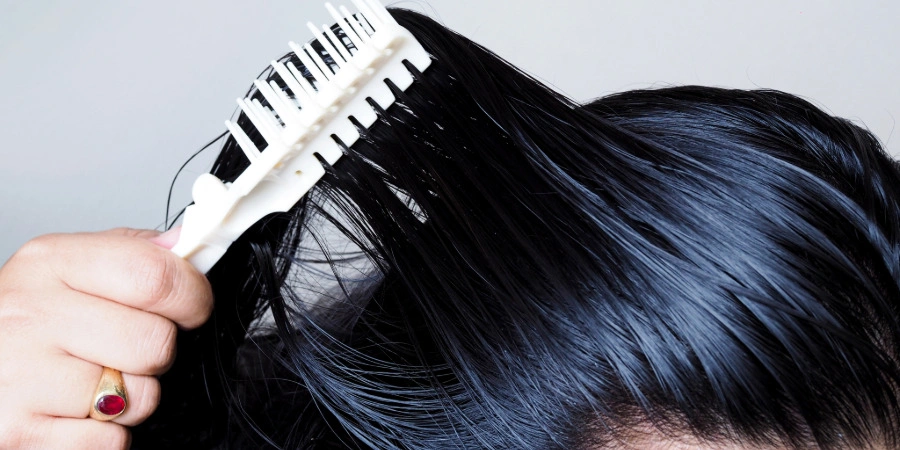
Signs and Symptoms
Recognizing oily scalp goes beyond just noticing greasy-looking hair. Here are the key indicators to watch for:
- Early Warning Signs:
- Hair appears oily or greasy within 12-24 hours after washing
- Scalp feels slick or sticky to the touch
- Hair lacks volume and appears flat against the head
- Difficulty maintaining hairstyles throughout the day
- Progressive Symptoms:
- Visible oil accumulation at the hair roots
- Hair strands clump together, creating a stringy appearance
- Scalp may develop an oily sheen that's visible to others
- Increased frequency of hair washing needed to maintain appearance
- When to Be Concerned:
If you notice these symptoms worsening despite proper hair care, or if they're accompanied by scalp irritation, persistent itching, or unusual odors, it's time to consult with hair care specialists who can provide professional assessment and targeted solutions. - Self-Assessment Indicators:
Try the "morning test" - if your hair looks oily when you wake up the day after washing, you likely have an oily scalp condition that would benefit from professional attention.
Root Causes and Risk Factors
Understanding what triggers excess oil production is crucial for effective treatment. Based on extensive research and client consultations at Holistic Hair Care, we've identified several primary and secondary factors:
- Primary Causes:
- Overwashing Your Hair:
Paradoxically, washing your hair too frequently can actually worsen oily scalp conditions. When you strip away natural oils too aggressively, your scalp responds by producing even more oil to compensate. This creates a frustrating cycle where the more you wash, the oilier your scalp becomes. - Stress Levels:
Chronic stress significantly impacts hormone production, particularly cortisol and androgens, which directly influence sebaceous gland activity. High stress levels can trigger or worsen oily scalp conditions, making stress management an essential component of treatment. - Genetics:
Your family history plays a significant role in determining your scalp's oil production patterns. If your parents or siblings struggle with oily hair, you're more likely to experience similar challenges. While you can't change your genetics, understanding this predisposition helps in developing effective management strategies. - Using Hair Products with Artificial Chemicals:
Many commercial hair products contain harsh sulfates, silicones, and synthetic fragrances that can disrupt your scalp's natural balance. These artificial chemicals may initially seem to help but often worsen oily scalp conditions over time by either over-stripping or building up on the scalp.
- Overwashing Your Hair:
- Secondary Contributing Factors:
- Hormonal fluctuations during puberty, pregnancy, or menopause
- Dietary factors, particularly high sugar and processed food consumption
- Environmental pollution and humidity levels
- Certain medications that affect hormone levels
- Inadequate scalp cleansing techniques
- Lifestyle Factors:
- Touching or running fingers through hair frequently
- Using heavy styling products or oils
- Sleeping on dirty pillowcases
- Wearing hats or headwear for extended periods
Types of Oily Scalp Conditions
Not all oily scalp conditions are identical. Hair care specialists recognize several variations that require different treatment approaches:
- Mild Oily Scalp:
Hair becomes slightly greasy by the end of the day, manageable with proper care routine adjustments and occasional professional treatments. - Moderate Oily Scalp:
Noticeable oil production within 12-24 hours of washing, requiring more intensive treatment approaches and regular professional maintenance. - Severe Oily Scalp:
Excessive oil production that makes hair appear unwashed within hours, often accompanied by secondary issues and requiring comprehensive professional treatment plans. - Location-Specific Variations:
- Crown-focused oiliness: Primarily affects the top of the head
- Hairline concentration: Excess oil along the forehead and temple areas
- All-over scalp involvement: Uniform oil distribution across the entire scalp
The Hidden Consequences: What Oily Scalp Leads To
Many people don't realize that an oily scalp is often just the beginning of a cascade of related issues. Understanding these connections helps explain why professional treatment is so important:
- Forehead Acne:
The excess oil from your scalp doesn't stay confined to your hair. It travels down to your forehead, especially along the hairline, clogging pores and creating the perfect environment for acne-causing bacteria. This is why many people notice breakouts along their hairline and forehead that seem resistant to typical acne treatments. - All Types of Dandruff:
Oily scalp creates ideal conditions for Malassezia, a yeast that naturally lives on your scalp but can overgrow when there's excess oil. This overgrowth leads to various forms of dandruff, from the classic white flakes to more stubborn, yellowish scales that stick to the scalp and hair. - Itchiness, Inflammation & Irritation:
The combination of excess oil, potential bacterial overgrowth, and the scalp's inflammatory response creates a cycle of discomfort. Many clients report constant itching that worsens throughout the day, leading to scratching that can damage the scalp and hair follicles.
These interconnected issues explain why addressing oily scalp requires a comprehensive approach rather than simply using oil-control shampoos. Professional hair care specialists understand these relationships and can develop treatment plans that address all aspects of the condition.
Diagnosis and Professional Assessment
While you might recognize oily scalp symptoms yourself, professional assessment provides crucial insights that guide effective treatment. Here's what to expect when you visit Holistic Hair Care for evaluation:
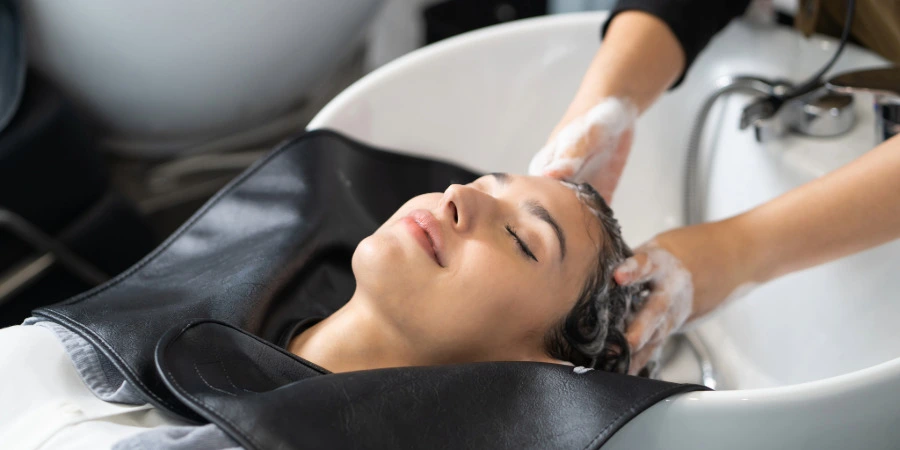
- When to Consult a Hair Care Specialist:
- Oily scalp symptoms persist despite changing your hair care routine
- You're experiencing secondary issues like forehead acne or persistent dandruff
- The condition impacts your confidence or daily activities
- Over-the-counter solutions haven't provided lasting results
- Professional Assessment Methods: Hair care specialists use various evaluation techniques to understand your specific condition:
- Detailed scalp examination using specialized magnification tools
- Oil production measurement over specific time periods
- Hair strand analysis to determine the extent of oil coating
- Lifestyle and health history review to identify contributing factors
- What to Expect During Your Consultation: Your hair care specialist will begin with a comprehensive discussion about your symptoms, hair care routine, lifestyle factors, and treatment goals. They'll examine your scalp and hair under proper lighting and may use diagnostic tools to measure oil production levels.
- Questions to Ask Your Specialist:
- What specific type of oily scalp condition do I have?
- What are the primary contributing factors in my case?
- What treatment approach do you recommend and why?
- How long should I expect to see results?
- What can I do at home to support professional treatments?
Prevention Strategies
Prevention and early intervention are always preferable to treating advanced oily scalp conditions. Here are evidence-based strategies that our hair care specialists recommend:
- Lifestyle Modifications:
Stress management plays a crucial role in controlling oil production. Regular exercise, adequate sleep, and stress-reduction techniques like meditation or yoga can significantly impact your scalp's oil production patterns. - Hair Care Routine Adjustments:
The key is finding the right balance - not overwashing, but maintaining adequate cleanliness. Most people with oily scalp benefit from washing every other day with gentle, sulfate-free shampoos rather than daily washing with harsh formulations. - Products to Avoid:
- Shampoos containing sodium lauryl sulfate or other harsh sulfates
- Heavy conditioners applied to the scalp area
- Oil-based styling products
- Products with excessive artificial fragrances or dyes
- Dry shampoos used as a replacement for regular washing
- Protective Measures:
- Change pillowcases frequently to prevent oil and bacteria buildup
- Avoid touching or running fingers through your hair
- Clean hair accessories regularly
- Choose breathable fabrics for hats and headwear
- Maintain a balanced diet rich in vitamins and minerals that support scalp health
Treatment Options Overview
Effective oily scalp treatment requires a multi-faceted approach that addresses both immediate symptoms and underlying causes. At Holistic Hair Care, our specialists develop personalized treatment plans based on your specific condition and lifestyle needs.
Professional Treatments Available: Check out our professional treatments →
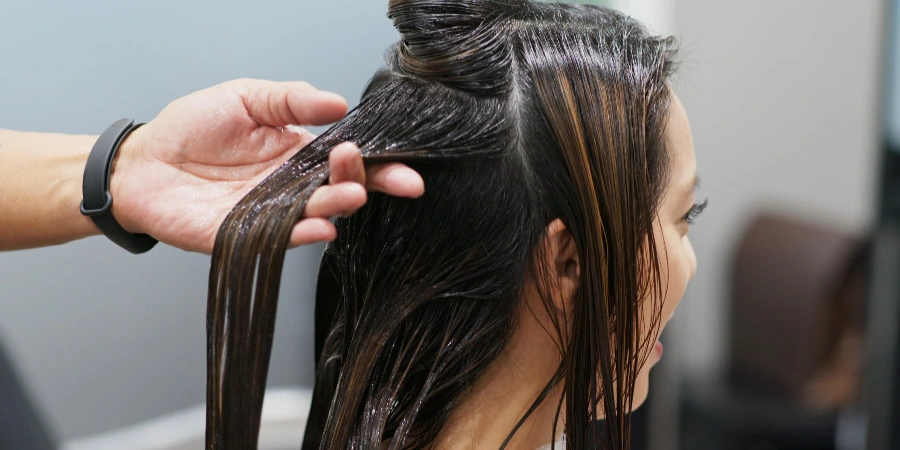
Living with Oily Scalp: Daily Management Tips
Managing oily scalp effectively requires developing sustainable daily routines that work with your lifestyle. Here are practical strategies that successful clients use:
- Daily Management Tips:
- Establish a consistent washing schedule based on your oil production pattern
- Use lukewarm water instead of hot water, which can stimulate more oil production
- Focus shampoo application on the scalp, allowing it to cleanse the hair lengths as you rinse
- Apply conditioner only to mid-lengths and ends, avoiding the scalp area
- Styling Suggestions:
- Choose hairstyles that work with your hair's natural texture rather than fighting against it
- Use minimal styling products and opt for lightweight formulations
- Consider shorter hairstyles that require less product and are easier to maintain
- Learn techniques for adding volume at the roots without using heavy products
- Confidence-Building Strategies:
Remember that oily scalp is a common, treatable condition. Many successful professionals and public figures manage similar challenges. Focus on the progress you're making rather than day-to-day fluctuations, and celebrate small improvements along your treatment journey. - Support and Resources:
At Holistic Hair Care, we believe in supporting our clients throughout their treatment journey. Our specialists are available for questions and adjustments to your care routine as needed. We also provide educational resources to help you understand your condition and make informed decisions about your hair care.
When to Seek Professional Help
While some oily scalp management can be handled through routine adjustments, certain situations require professional intervention from qualified hair care specialists.
- Red Flags and Warning Signs:
- Sudden increase in oil production without obvious cause
- Persistent scalp irritation or inflammation despite gentle care
- Secondary infections or unusual odors
- Significant hair loss or thinning associated with oily scalp
- Severe impact on quality of life or self-confidence
- Choosing the Right Hair Care Specialist:
Look for professionals who specialize in scalp conditions and have experience treating oily scalp specifically. At Holistic Hair Care, our specialists receive ongoing training in the latest scalp care techniques and maintain up-to-date knowledge of effective treatment approaches. - Treatment Expectations and Timelines:
Realistic expectations are crucial for treatment success. Most clients begin seeing improvements within 2-4 weeks of starting professional treatment, with significant results typically achieved within 2-3 months. However, individual responses vary based on the severity of the condition and consistency with treatment recommendations.
Your hair care specialist will provide a clear timeline for your specific situation and adjust treatments as needed based on your progress.
Frequently Asked Questions

- Q: How often should I wash my hair if I have an oily scalp?
A: This varies by individual, but most people with oily scalp benefit from washing every other day rather than daily. Overwashing can actually worsen the condition by causing your scalp to produce more oil to compensate. Your hair care specialist can help determine the optimal frequency for your specific situation. - Q: Can stress really cause oily scalp?
A: Yes, stress significantly impacts hormone production, particularly cortisol and androgens, which directly influence oil production in your scalp. Managing stress through exercise, adequate sleep, and relaxation techniques can noticeably improve oily scalp conditions. - Q: Will my oily scalp condition improve as I get older?
A: Oil production typically decreases with age, so many people do see improvement over time. However, this process is gradual and varies greatly between individuals. Professional treatment can provide much faster and more predictable results than waiting for natural changes. - Q: Is it true that brushing my hair more will help distribute the oils?
A: While gentle brushing can help distribute natural oils along the hair shaft, excessive brushing of an already oily scalp can actually stimulate more oil production and spread bacteria. Focus on gentle scalp massage instead of aggressive brushing. - Q: Can diet affect my oily scalp condition?
A: Yes, diet can play a role. High sugar intake, processed foods, and dairy products may worsen oily scalp in some people. A balanced diet rich in vitamins, minerals, and omega-3 fatty acids supports overall scalp health. - Q: How long does it take to see results from professional treatment?
A: Most clients notice initial improvements within 2-4 weeks, with significant results typically achieved within 2-3 months. However, individual responses vary based on the severity of the condition and consistency with treatment recommendations. - Q: Are expensive shampoos better for treating oily scalp?
A: Price doesn't always indicate effectiveness. The key is choosing products with appropriate ingredients for your specific scalp type and avoiding harsh chemicals that can worsen the condition. Your hair care specialist can recommend suitable products within your budget. - Q: Can hormonal changes affect oily scalp?
A: Absolutely. Puberty, pregnancy, menopause, and even monthly menstrual cycles can all influence oil production. If you notice changes in your scalp condition that coincide with hormonal fluctuations, discuss this with your hair care specialist for targeted management strategies.
Take Control of Your Oily Scalp Today
Oily scalp doesn't have to control your life or limit your confidence. With proper understanding, professional guidance, and consistent care, you can achieve the healthy, manageable hair you deserve.
The key takeaways from this comprehensive guide include recognizing that oily scalp is a treatable condition with identifiable causes, understanding that overwashing often worsens the problem, and knowing that professional treatment combined with proper home care provides the most effective results.
At Holistic Hair Care, with convenient locations in Kepong, Cheras, and Puchong, our experienced hair care specialists are ready to help you develop a personalized treatment plan that addresses your specific needs and lifestyle. We understand the frustration and embarrassment that oily scalp can cause, and we're committed to helping you achieve lasting results.
Don't let another day pass feeling self-conscious about your hair. Contact Holistic Hair Care today to schedule your comprehensive scalp assessment and take the first step toward the confident, comfortable relationship with your hair that you deserve.
Ready to start your journey to healthier hair? Book your consultation with our expert hair care specialists at Holistic Hair Care. Call us or visit our locations in Kepong, Cheras, or Puchong to begin your personalized treatment plan today.
